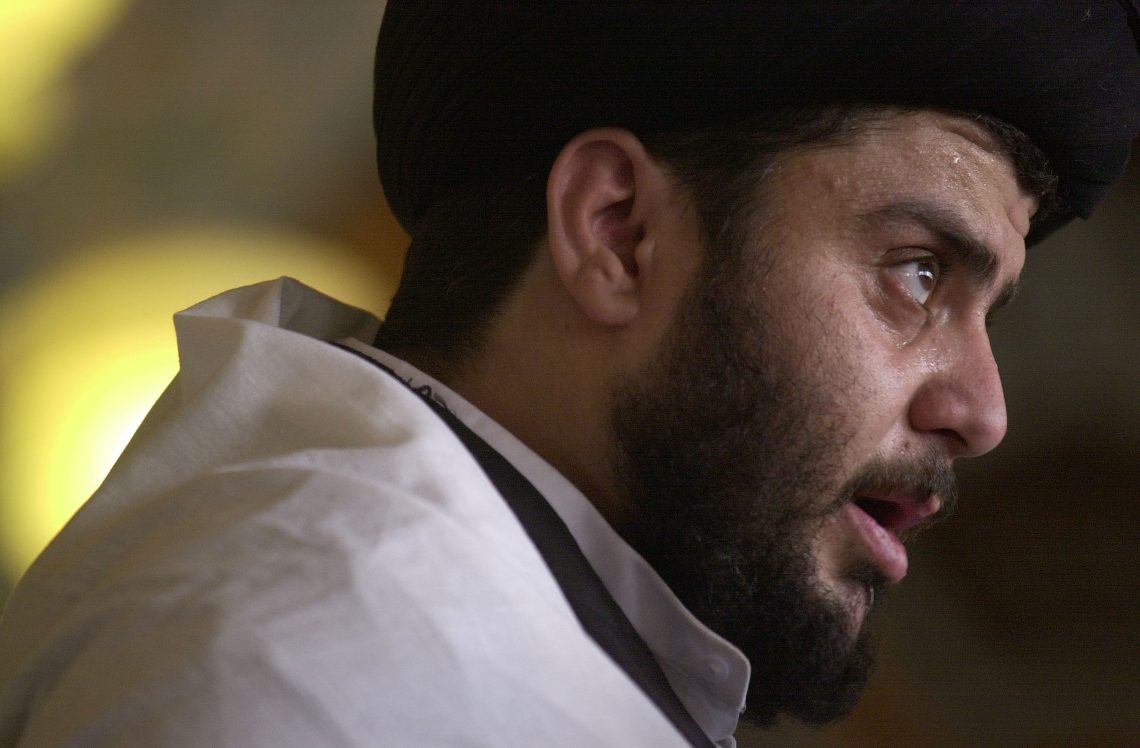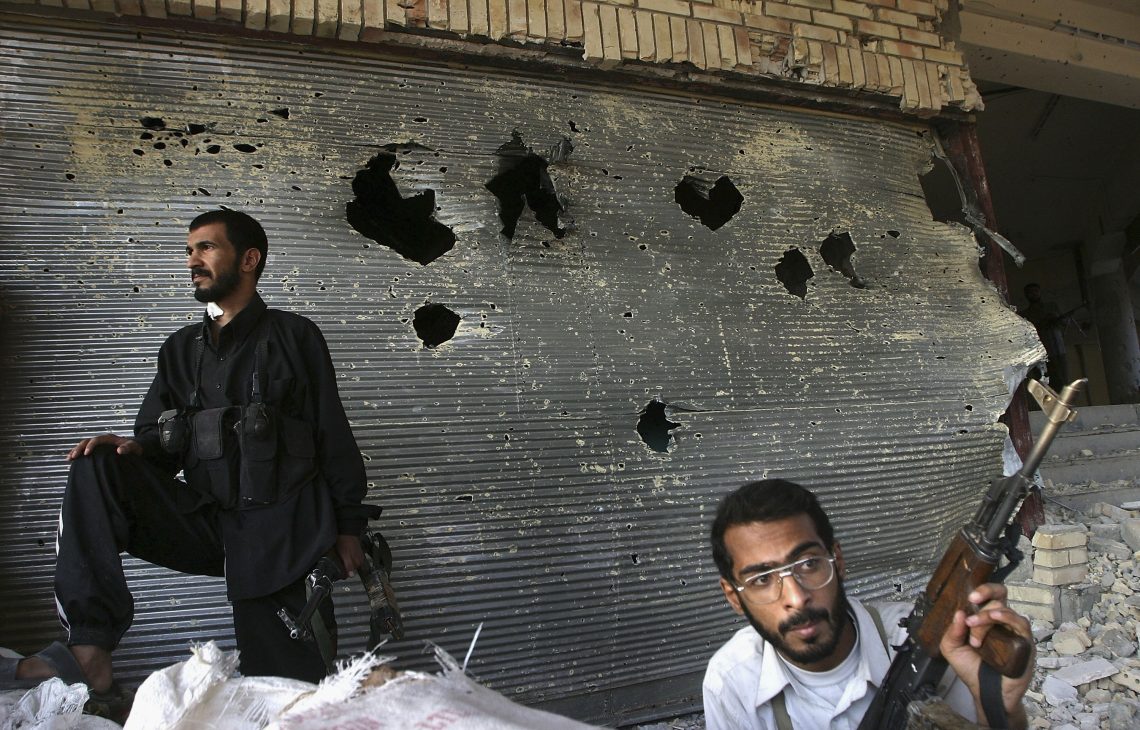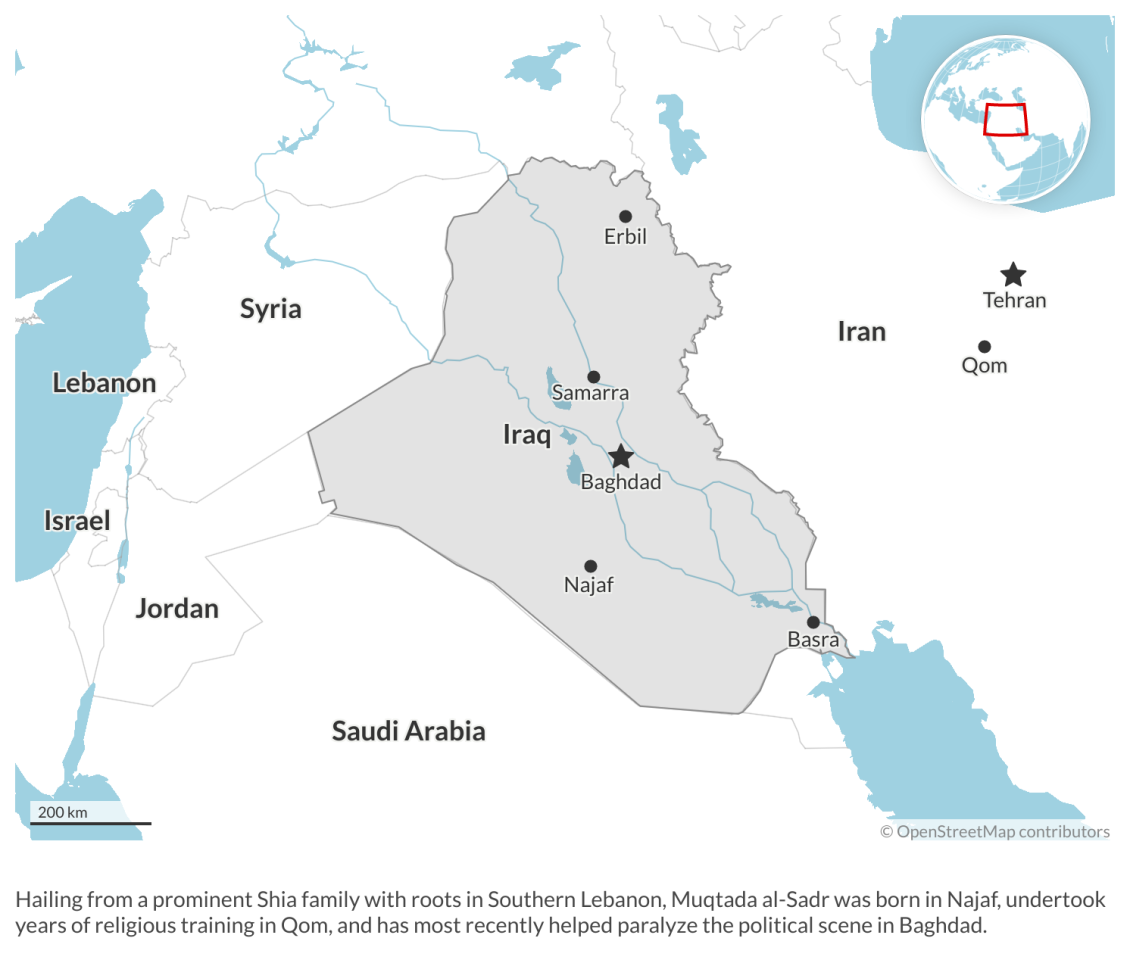Who is Muqtada al-Sadr? Part 1: Beginnings
The controversial Shia cleric and militia leader has long been at the heart of Iraq’s political intrigue.

In a nutshell
- The enigmatic Iraqi cleric has long been at the center of Iraqi politics
- His private militias shaped years of conflict in the country
- The American withdrawal set the stage for confrontation with Iran
Nearly a year after Iraq’s last parliamentary election, the country’s political system remains frozen in crisis. The man who seemed to emerge as kingmaker after last October’s vote – Muqtada al-Sadr – proved unable to secure a coalition government, while thousands of his followers took to the streets, storming the halls of government.
This failure of the Shia cleric, who announced his retirement from politics for at least the fourth time, is casting a shadow on his chances of shaping events to come.
Muqtada al-Sadr was born in Najaf, Iraq, on August 4, 1974, to a prominent Shia clerical family with roots in Lebanon’s Jabal Amil region. The fourth and youngest son of Ayatollah Muhammad Muhammad Sadiq al-Sadr, he was considered the least intellectual of his brothers, but he was a good organizer and his father trusted him with the daily management of some of his madrassas.
Mr. Sadr’s political career is marked by several major turning points. Notwithstanding his repeated resignations, his emotional decision-making and his ideological contradictions, throughout the years he has stuck to two principles: that Iraq must have self-rule, and that he must be a central player in his country’s politics.
A father’s death
In April 1980, Saddam Hussein executed his father’s cousins, Ayatollah Muhammad Baqir al-Sadr and his sister, a scholar. The death of the former – the most senior cleric yet killed by the regime – shocked the extended al-Sadr family and the Shia community.
Muqtada al-Sadr’s father, Muhammad Sadiq, a religious scholar of rising influence, decided to keep a low profile. In the late 1980s, he even began to collaborate with the regime of Saddam Hussein, though quietly enough to avoid controversy in Shia society. The Iraqi dictator allowed him to establish some institutions and preach Islam to the Shia tribes and in Saddam City – the sprawling shantytown in northeast Baghdad, which in 2003 was renamed in his memory.
His father was a proud Arab and Iraqi, leading to competition with Shia Iran.
In 1998, Saddam allowed the elder al-Sadr to begin holding communal Friday prayers, a practice not seen in Shia areas for some time. He did this at his Friday mosque services in Kufa, near Najaf, sermons that attracted tens of thousands of young Shia eager to hear some anti-Baath preaching. Muhammad Sadiq al-Sadr carefully straddled the line between obeying and criticizing the regime – never explicitly crossing it, but attacking all the other Iraqi ayatollahs for their passivity and fear of Saddam. This generated a bitter rivalry with their leader, Grand Ayatollah Ali al-Sistani. Critically, in the fall of 1999, he declared himself Wali Amr al-Muslimin, the one responsible for all the world’s Muslims. This implied that the true leader of the Iranians and the Shia world was not Iran’s Supreme Leader Ayatollah Ali Khamenei, but the elder al-Sadr.
Mr. Khamenei was incensed – as this was a title reserved in Iran only for him and his predecessor, Ayatollah Khomeini – and closed all the offices in Iran belonging to Muqtada’s father. In December 1999, Muhammad Sadiq al-Sadr was gunned down in his car on the outskirts of Najaf. Muqtada’s two elder brothers, both highly respected religious scholars, died in the same hail of bullets.
A ready martyr
Most blamed the assassination on Saddam, but it would have been a serious mistake on his part to murder the senior al-Sadr. The religious leader had served the regime’s purposes well by preventing mass clashes with Shia Iraqis. He had also offended other Najaf clerics whom Saddam reviled and, most helpfully, humiliated and drew the ire of Saddam’s archenemy, Iranian Supreme Leader Khamenei. The latter, on the other hand, had very good reason to eliminate such a formidable competitor – a fact that cannot have escaped Muqtada’s attention.
The death of his father and brothers represented the first turning point in Muqtada’s adult life. Thereafter, he frequently appeared wearing white shrouds and declared himself ready to become a martyr. His father’s slain cousin, Baqir al-Sadr, also acted similarly before his arrest and execution. But Muqtada al-Sadr is far from genuinely seeking martyrdom; he has taken risks, but has always left himself a way out.
From his father, he inherited a few central political principles to which he still adheres. One is enmity toward the United Kingdom, the United States and Israel, which his father called “the ill-fated trinity.” These days, Mr. Sadr’s intense ire is reserved exclusively for Israel.
Another central pillar is his father’s attachment to Shia history and eschatology (like the expected Return of the Mahdi) and to Islamic law, though without embracing fanatical bigotry. Therefore, while Muqtada has found it easy to allow the killing of Sunnis for no other reason than their being Sunnis, he can also easily befriend Sunni Arabs and Kurds when necessary.
Finally, his father was a proud Arab and Iraqi, leading to competition with Shia Iran. When politically expedient, Muqtada collaborated with the Iranian Quds Force, and even stayed in Iran; now he is confronting the regime.
Facts & figures
From his father’s death until 2003, Mr. Sadr kept a very low profile. He accepted Saddam’s financial support because turning it down would have gotten him killed. Still, if he actually served Saddam, he did so very quietly. He kept supporting his father’s flock, the poorest Shia, with social help and religious guidance through a network of low-level clerics.
Muqtada al-Sadr is not charismatic in the usual sense; he derives his charisma from the people’s admiration for his father, an admiration that he has nurtured. For his ardent supporters, who risk their lives for him, the son of a martyred saint is also a saint. To great effect, he continues to remind them that he, too, may soon become a martyr. But while they admire him, Mr. Sadr treats his followers like a capricious nanny, threatening to disown them if they do not immediately abide by his orders.
The American enemy
The U.S. occupation of Iraq was Muqtada al-Sadr’s second turning point. Soon afterward, he sprang from his quiet activities into a political and military frenzy.
Why? First, fighting U.S. forces was a fulfillment of his father’s legacy. Second, it portrayed him as a heroic Iraqi and Muslim patriot, increasing his popularity. Finally, he understood that the Americans are not the British of old, and certainly not Saddam. They might have the ability to kill him, but, thanks to their political values, they would not.
Mr. Sadr established his private army, Jaysh al-Mahdi, named after the Shia Redeemer, the Vanished Twelfth Imam, who is expected to rise and lead the faithful to a final battle at the end of times. (In 2014, he changed the group’s name to Saraya al-Salam, the “Peace Companies.”) His fighters came from the same elements his father nurtured, and he ordered them to kill American soldiers – often providing them with Captagon pills, a potent psychostimulant to send them into battle in a frenzy.
The American occupation of Iraq was Muqtada al-Sadr’s second turning point.
Iran was very helpful in providing weapons and improvised explosive devices. This led to myriad confrontations between his Mahdi militia and American soldiers, with many casualties on both sides. Mr. Sadr’s forces also fought against supporters of his late father’s enemies, the four grand ayatollahs of Najaf, led by Ayatollah al-Sistani.
Soon after the Americans occupied Najaf, his militia murdered the pro-American Ayatollah Abdul-Majid al-Khoei, son of the late chief ayatollah. When the holy Shia Al-Askari Shrine in Samarra was blown up in 2006, Mr. Sadr likely saw it as a personal attack against him, as his militia’s namesake imam vanished in Samarra in the ninth century. His Mahdi Army became the cutting edge of fighting the Sunnis.
The Ayatollah
In August 2004, Muqtada al-Sadr occupied the Holy Shrine of Imam Ali in Najaf, among the most sacred Shia sites. He was besieged by the U.S. Marines, but his life was saved by his late father’s nemesis, Ayatollah al-Sistani. They met at the latter’s home, and Mr. Sadr agreed to order his fighters to lay down their weapons and leave Najaf.
The meeting changed him – the third turning point in his life, after his father’s violent death and the U.S. invasion. Mr. Sadr seems to have been in quest for a spiritual father, and found him in Ayatollah al-Sistani.
While his official religious “source of emulation” (muqallad) was Iran’s Grand Ayatollah Kadhim Husayni al-Haeri, Mr. Sistani became his true guide. Because this clashed with his father’s legacy, and because he needed to provide his wild supporters with a target, he still disobeyed Mr. Sistani’s call not to fight the Americans. Yet he has never again attacked the ayatollah or his supporters and, after the U.S. evacuation from Iraq in 2011, never antagonized him politically. Often, he has even acted as if they were perfectly in sync.

In 2007, feeling the heat from the U.S. “surge,” Mr. Sadr escaped to Iran, where he studied for four years in Qom. The following year, with the Mahdi Army growing dominant in the Iraq city of Basra, Iraqi Prime Minister Nouri al-Maliki sent in troops to subdue them, with massive American and British assistance.
It was a humiliation that Muqtada al-Sadr could never forgive, although he decided to serve his revenge cold. While he criticized Mr. Maliki for failing to demand an immediate exit of U.S. forces, he still supported him for the premiership after the elections of 2010.
The withdrawal of U.S. forces in December 2011 was the next turning point. With no Americans left to fight, Mr. Sadr returned to Iraq and launched his long-term campaign against Mr. Maliki – and, less conspicuously, against Iran.
In 2012, he would split the parliamentary Shia camp for the first time, joining forces with Masoud Barzani’s Kurdistan Democratic Party. And by 2014, he would help replace Nouri al-Maliki as prime minister with Haidar al-Abadi.
Within a few more years, Muqtada al-Sadr’s campaign against Tehran would break out into the open, setting the stage for political crisis.
Come back tomorrow for Part 2, on Muqtada al-Sadr’s confrontation with Iran.









